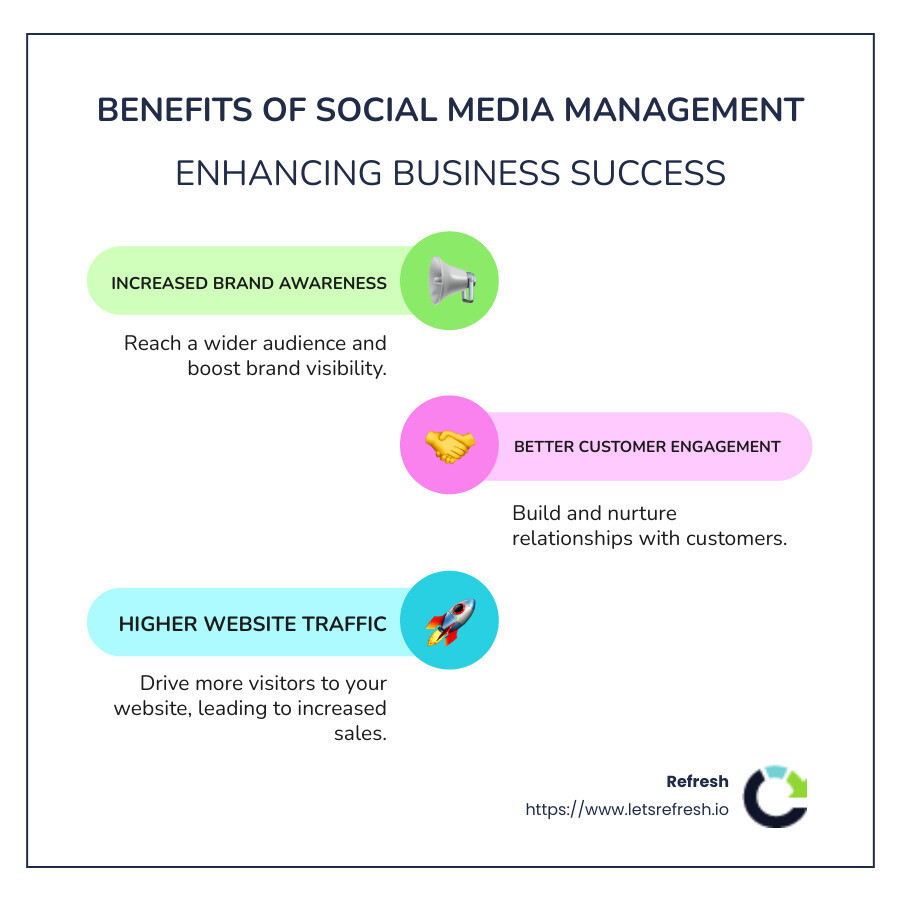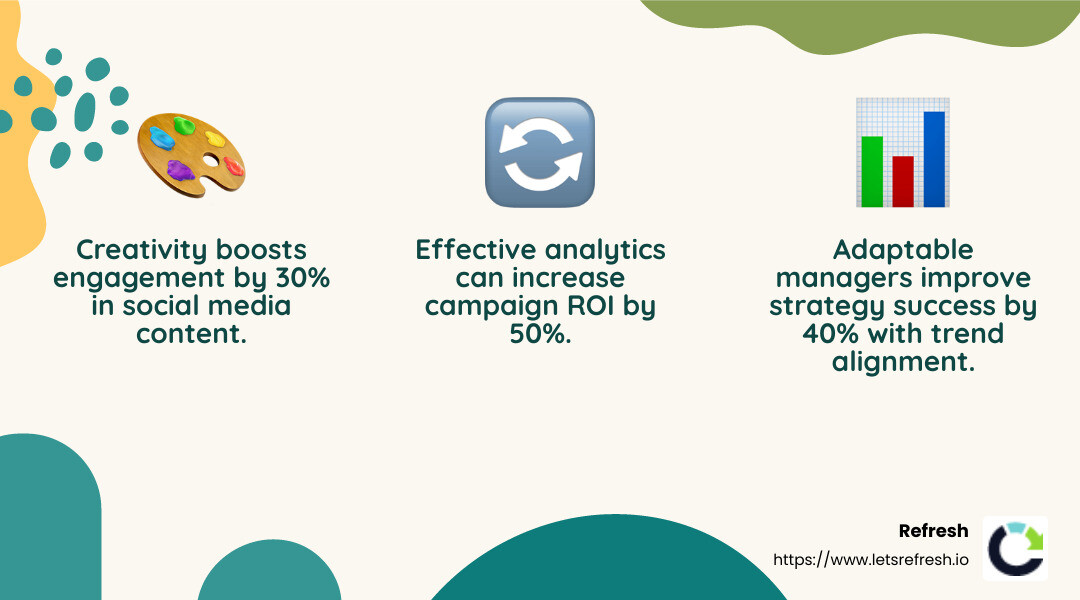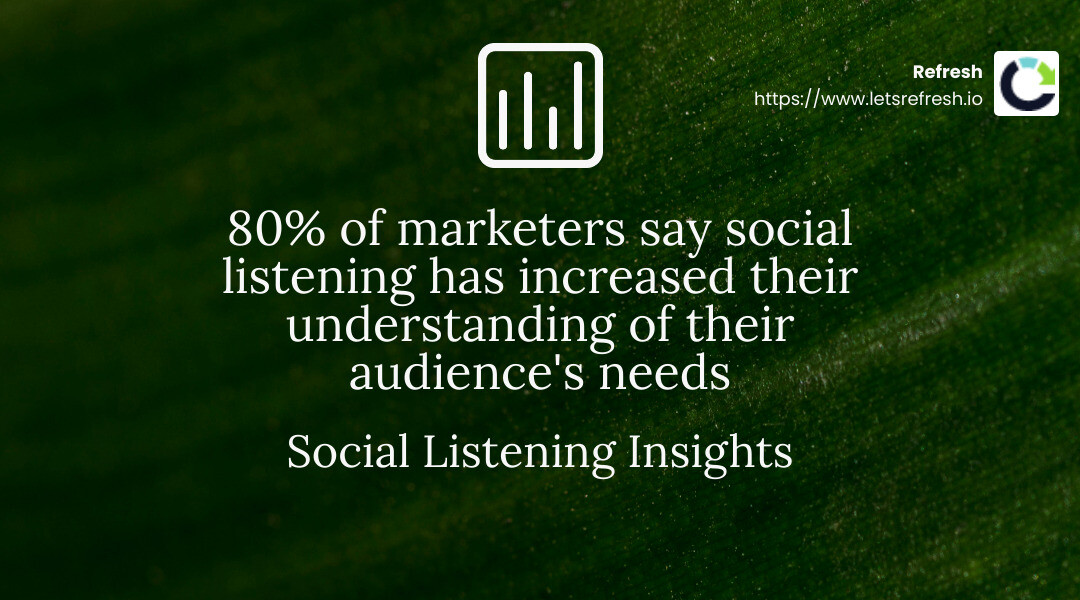July 24, 2025

Social media management is critical for businesses today. It involves creating, scheduling, and analyzing content to engage your audience on platforms like Facebook, Instagram, and Twitter. Here’s a quick overview of its importance:
- Boosts brand awareness: Reach more people and increase recognition.
- Engages customers: Foster stronger relationships and loyalty.
- Drives traffic and sales: Direct more visitors to your website, converting them into paying customers.
For tech startup founders, social media management is especially vital to stay competitive and visible in the digital landscape.
At Refresh Digital Strategy, we understand the nuances of social media management. Our expertise lies in crafting digital strategies that improve online visibility and drive business success. As Alexander Palmiere, I bring years of experience in helping businesses thrive in the digital space through effective social media management.
What is Social Media Management?
Social media management is the practice of handling your brand's presence across social platforms. It's about creating and sharing content that resonates with your audience, engaging with followers, and analyzing performance to refine your strategy.
Key Components
- Content Creation: Crafting compelling posts is the heart of social media management. This involves designing visuals, writing engaging captions, and aligning content with your brand's voice. For instance, brands like Duolingo and Patagonia have mastered this by using creative content to connect with their audiences.
- Scheduling: Timing is everything. Scheduling tools help you post content at optimal times to maximize visibility and engagement. This ensures your brand stays relevant and maintains a consistent presence.
- Engagement: Building relationships with your audience is crucial. This means responding to comments, messages, and participating in conversations. It helps in nurturing a loyal community around your brand.
- Analytics: Analyzing data is vital to understand what works and what doesn’t. By tracking metrics like likes, shares, and comments, you can gain insights into audience preferences and refine your strategies accordingly.
Benefits
- Brand Awareness: A well-managed social media presence increases your brand's visibility. By consistently engaging with your audience and sharing valuable content, your brand becomes more recognizable.
- Customer Relationships: Social media provides a platform for direct interaction with customers. This fosters trust and loyalty, as customers feel heard and valued.
- Audience Growth: Through strategic content and engagement, you can attract new followers and expand your reach. This growth not only boosts your brand's online presence but also opens up new opportunities for business expansion.
By mastering these components, social media management can transform how your brand interacts with its audience, driving both engagement and growth.
The Role of a Social Media Manager
A social media manager is like the conductor of an orchestra, harmonizing all the elements of a brand's online presence. Their role is crucial in today's digital landscape, where social platforms are key to connecting with audiences.
Essential Skills
To excel in this role, a social media manager needs a blend of creativity, adaptability, critical thinking, and organization.
- Creativity: Crafting engaging content requires a creative mindset. Whether it's designing eye-catching visuals or writing captivating captions, creativity helps in making content stand out.
- Adaptability: Social media trends change rapidly. A successful manager is flexible and can quickly pivot strategies to align with new trends or platform updates.
- Critical Thinking: Analyzing data to make informed decisions is vital. Managers need to assess what content works, why it resonates, and how to improve future posts.
- Organization: Managing multiple platforms and campaigns requires strong organizational skills. Keeping track of content calendars, deadlines, and analytics is essential for maintaining a seamless workflow.
Daily Tasks
A day in the life of a social media manager is dynamic and varied. Here are some core responsibilities:
- Content Creation: This involves generating ideas for posts, crafting visuals, and writing copy that aligns with the brand's voice. It's about telling a story that resonates with the audience.
- Campaign Strategies: Developing and executing social media campaigns is a key part of the job. This includes setting goals, planning content, and measuring success. Campaigns should align with broader marketing objectives.
- Engagement and Community Management: Interacting with followers is crucial. This means responding to comments, answering messages, and engaging in conversations to build a loyal community.
- Reporting and Analytics: Analyzing performance metrics is essential to understand the impact of social efforts. Regular reports help in identifying trends, measuring success, and refining strategies.

By mastering these skills and tasks, a social media manager can effectively drive a brand's online presence, fostering growth and engagement.
How to Manage Social Media Profiles
Managing social media profiles can seem daunting, but with the right strategies and tools, it becomes a manageable and rewarding task. Let's explore how you can effectively handle your brand's online presence.
Finding Your Target Audience
Understanding your target audience is the cornerstone of successful social media management. Knowing who you're speaking to helps tailor your content and engagement strategies to resonate with them.
- Audience Analysis: Start by analyzing your current audience. Who are they? What are their interests? Where do they spend their time online? Use tools like Google Analytics or social media insights to gather data on demographics and behavior.
- Engagement Strategies: Once you've identified your audience, engage them with content that speaks to their interests and needs. Ask questions, create polls, and encourage user-generated content to foster interaction and community building.
Content Creation and Planning
Creating and planning content is both an art and a science. It requires creativity, strategic thinking, and a bit of planning.
- Content Types: Diversify your content to keep your audience engaged. Use a mix of videos, infographics, blog posts, and live sessions. 68% of consumers follow brands to stay informed about new products and services.
- Content Calendar: Organize your content with a calendar. This helps in maintaining a consistent posting schedule and ensures you're covering all your content pillars. A fitness brand, for example, might focus on workout tips, nutrition advice, and success stories.
- Repurposing Content: Maximize your efforts by repurposing content across different platforms. A blog post can be turned into a series of social media posts or a video can be split into shorter clips for different channels.
Tools for Social Media Management
Using the right tools can streamline your social media management efforts, saving time and ensuring consistency.
- Scheduling Tools: Tools like Sprout Social allow you to schedule posts in advance, ensuring you're consistently reaching your audience at optimal times without having to be online 24/7.
- Analytics Tools: Understanding the impact of your content is crucial. Analytics tools provide insights into what’s working and what’s not, helping you refine your strategy. Track metrics like engagement rates, reach, and conversions.
- Engagement Tools: Keep track of mentions, comments, and messages with engagement tools. These tools help you respond promptly and maintain a strong connection with your audience.
By leveraging these strategies and tools, you can effectively manage your social media profiles, ensuring your brand remains visible and engaging to your target audience. Next, we'll explore the top social media management tools available and how to choose the right one for your needs.
Social Media Management Tools
Navigating social media can be overwhelming, but using the right social media management tools can make all the difference. These tools help streamline your social media activities, such as scheduling posts, analyzing metrics, and engaging with your audience. Let's explore some of the top tools and how to choose the right one for your needs.
Top Tools
- BufferBuffer is a favorite among creators and small businesses for its simplicity and efficiency. It offers a free plan and paid options starting at $6/month per channel. Key features include:
- Create Space: Organize ideas and content with tags and a Kanban board.
- Buffer Remix: Transform URLs into Instagram-worthy images.
- Start Page: Build a customizable landing page.
- Engagement Tools: Manage comments from Facebook and Instagram in one dashboard.
- HootsuiteHootsuite is an all-in-one platform that supports multiple social sites. It excels in:
- Search and Filter: Find brand mentions and insights quickly.
- Cross-Platform Management: Schedule and post across various platforms.
- Analytics: Collect data for comprehensive reports.
- Sprout SocialSprout Social is known for its smart scheduling and analytics. It offers:
- Scheduling: Plan your posts in advance.
- Analytics: Gain insights into engagement and audience behavior.
- Engagement Tools: Respond to comments and messages efficiently.
- Zoho SocialZoho Social is a versatile tool that provides:
- Scheduling: Easily plan and publish content.
- Monitoring: Track brand mentions and keywords.
- Analytics: Measure performance with detailed reports.
Choosing the Right Tool
When selecting a social media management tool, consider the following factors:
- Business Size and Needs: Small businesses might prefer Buffer for its simplicity, while larger businesses might benefit from Hootsuite's extensive features.
- Budget: Determine what you can afford. Buffer offers a free plan, while other tools may have higher costs.
- Features: Identify the features that are most important to you, such as scheduling, analytics, or engagement tools.
- Ease of Use: Choose a tool that is intuitive and easy for your team to use.
- Integration: Consider how well the tool integrates with other platforms and tools you use.
Here's a quick comparison table to help you decide:
ToolBest ForStarting PriceKey FeaturesBufferCreators, Small Businesses$6/month/channelScheduling, Engagement, CustomizationHootsuiteLarge EnterprisesVariesCross-Platform Management, AnalyticsSprout SocialAnalytics, EngagementVariesSmart Scheduling, Detailed AnalyticsZoho SocialTeams, MonitoringVariesCollaboration, Monitoring, Analytics
Choosing the right tool can significantly improve your social media strategy, helping you to engage effectively with your audience and grow your brand. Next, we'll dig into advanced strategies in social media management, including influencer marketing and social listening.
Advanced Strategies in Social Media Management
As you become more comfortable with the basics of social media management, it's time to explore advanced strategies that can further boost your brand's presence. This includes leveraging influencer marketing, utilizing social listening, and optimizing paid social media efforts.
Influencer Marketing
Influencer marketing involves partnering with individuals who have a significant following and influence over your target audience. These influencers can amplify your brand message and drive engagement.
- Finding Influencers: Start by identifying influencers who align with your brand values and have an audience that matches your target demographic. Use tools like influencer databases or social media platforms to research their reach and engagement rates.
- Collaboration Strategies: Collaborating with influencers can take many forms, such as sponsored posts, product reviews, or even joint events. Ensure that the partnership feels authentic and that the influencer genuinely believes in your product or service.
Case Study: Brands like Duolingo have successfully used influencers to expand their reach and engage new audiences by creating fun and educational content that resonates with their followers.
Social Listening
Social listening is the process of monitoring digital conversations to understand what customers are saying about your brand and industry. It goes beyond just tracking mentions—it's about analyzing sentiment and gaining insights.
- Monitoring Mentions: Use tools to track mentions of your brand, products, and relevant keywords across social media platforms. This helps you stay informed about what people are saying and identify any potential issues quickly.
- Analyzing Sentiment: Understanding the sentiment behind these conversations is crucial. Are people talking positively about your brand, or are there areas of concern? Sentiment analysis can guide your content strategy and help improve customer satisfaction.

Paid Social Media
Paid social media involves using advertising on social platforms to reach a broader audience. It's an effective way to target specific demographics and achieve measurable results.
- Ad Campaigns: Develop clear objectives for your ad campaigns, such as increasing brand awareness or driving sales. Design visually appealing ads with compelling copy to capture attention.
- Targeting: Take advantage of the sophisticated targeting options available on platforms like Facebook and Instagram. You can target users based on their interests, behaviors, and demographics to ensure your ads reach the right audience.
- Budget Management: Set a realistic budget for your campaigns. Start small and scale up as you see which ads perform best. Regularly review and adjust your budget allocation to optimize your return on investment.
By implementing these advanced strategies, you can improve your social media presence and build stronger connections with your audience. Next, we'll explore frequently asked questions about social media management to address common queries and concerns.
Frequently Asked Questions about Social Media Management
What is social media management?
Social media management is the practice of handling a business's online presence on social media platforms like Facebook, Instagram, Twitter, and LinkedIn. It involves creating and scheduling content, engaging with followers, analyzing performance, and managing online reputation. The goal is to grow and nurture an audience, boost brand awareness, and build strong customer relationships. As trends evolve, so do the strategies and tools used in social media management, making it a dynamic and essential component of digital marketing.
What does a social media manager do?
A social media manager plays a crucial role in shaping a brand's online persona. Their responsibilities include:
- Content Creation: Crafting engaging posts that resonate with the target audience.
- Community Engagement: Interacting with followers by responding to comments and messages.
- Strategy Development: Planning campaigns and setting goals to improve brand visibility.
- Analytics and Reporting: Monitoring performance metrics to measure the success of social media efforts.
- Trend Monitoring: Keeping up with the latest social media trends and platform updates.
Social media managers are often the voice of the brand, making them vital for maintaining a consistent and positive image in the digital space.
How much do you pay a social media manager?
The salary of a social media manager varies widely depending on factors such as experience, location, and the size of the company. On average, social media managers earn between $50,000 and $70,000 per year in the United States. However, entry-level positions may start at around $40,000, while experienced managers in large organizations can earn upwards of $100,000 annually.
Freelancers or part-time social media managers might charge hourly rates ranging from $20 to $100, depending on their expertise and the scope of work required. It's important for businesses to assess their needs and budget to determine the appropriate compensation for a social media manager.
Conclusion
Social media management is more than just posting updates—it's about building relationships, creating engaging content, and strategically growing your brand's presence online. By understanding the core components and leveraging the right tools, businesses can effectively connect with their audience and improve their digital footprint.
At Refresh, we specialize in helping small to medium-sized businesses steer the changing landscape of social media. Our approach integrates SEO, branding, and social media management to ensure a cohesive digital strategy. We focus on long-term partnerships, offering expert Webflow support to keep your website at the forefront of search engine results.
As we look to the future, it's clear that social media will continue to be a critical channel for businesses. By staying adaptable and informed about the latest trends and tools, you can ensure your brand remains relevant and successful.
Ready to lift your social media strategy? Contact us to see how we can help your business thrive in the digital age.
Still have questions? Let’s talk about it.
.avif)





